This Thai Shrimp Curry combines juicy shrimp and hearty butternut squash simmered in a simple, flavorful, creamy red curry sauce. Perfect for a quick and impressive weeknight dinner!
In our house curries like this stovetop yellow chicken curry and Thai chicken curry are the most asked quick dinner recipes.

Why You’ll Love My Thai Shrimp Curry

This Thai shrimp curry is one of original recipes back from 2015 when I first started blogging. I just re-tested it and updated the photos.
The resulting shrimp curry recipe is a restaurant quality meal that is creamy, sweet, with a slight kick, and contains a delicious combination of healthy fats, protein, and complex carbohydrates.
My family was all over it! What surprised me once again how well the sweet potato pairs with the creamy sweet sauce! I debated to omit it to make more of a simple shrimp curry but I am so glad I didn’t. And I urge you to keep it as well!
However, you could replace it with other vegetables, although won’t be the same…Please see additions below.
Reader’s Review
I love this recipe! I’ve also made it with chicken and it works perfectly.
Michaela
Ingredients and Notes
This dinner may seem like it would be chock full of hard-to-find ingredients but it’s mostly pantry staples, with a pre-prepared curry paste that’s full of flavor.

- Shrimp: I use previously frozen peeled and deveined large shrimp. You can defrost it in the fridge overnight or place in a large bowl with cold water for 10-15 minutes, then drain well.
- Butternut squash: Chopped into 1-inch cubes. I also love to use sweet potatoes instead.
- Red bell pepper: Feel free to go for sweet orange or yellow bell pepper.
- Aromatics: I use fresh garlic, onion, and ginger (you can use 1-2 teaspoons dried ginger, if that’s all you have).
- Coconut milk: I initially always used canned light coconut milk. However, for creamy results, I now use full-fat coconut milk. You can use either. My favorite brand is Thai kitchen.
- Red curry paste: I use Thai Kitchen red curry paste. Yellow or green curry paste will work too.
- Tomato paste: I use low sodium tomato paste as the fish sauce is salty.
- Fish sauce: This has a very savory, salty, umami flavor to add to dishes to elevate them.
- Any sweetener: Just a little is needed to balance the spicy and savory flavors.
- Oil: I like neutral cooking oil such as avocado oil.
- Salt and pepper: To season.
- To garnish: Add lime wedges, green onion, and cilantro. You could also add thinly sliced red chili for extra heat.
Additions
- Other vegetables: If you don’t love squash or sweet potatoes, feel free to add broccoli, cauliflower, potatoes, zucchini, peas or snow peas. Chop them small and cook time will differ, cook until fork tender.
- Lemongrass: This is a classic addition to Thai curries but not always easy to find. If using, chop into small pieces, bruise with the knife, and add to the pan with all the shrimp curry sauce ingredients.
- Peanut butter: The combination of red curry paste with peanut butter and shrimp makes for a truly creamy, swoon-worthy experience. Add 1-2 tablespoons.
- To increase the spice: Add a little chili paste, red pepper flakes, and/or garnish with sliced red chili. You can also increase the amount of red curry paste.
How to Make Thai Shrimp Curry

- Sauté the veggies: Cook onion, garlic and bell pepper in a large skillet for 4-5 minutes over medium-high heat. The aim is for them to become softened and more translucent, not browned.
- Make sauce: Add coconut milk, tomato paste, fish sauce, red curry paste, maple syrup, salt and pepper. Stir and once boiling, reduce heat to low.
- Add butternut squash: Add the squash or sweet potato, stir, cover, and simmer for 15-20 minutes or until the squash is tender.
- Add shrimp: Add shrimp, cover, and cook for a further 4-5 minutes. Be careful not to overcook or the shrimp will become rubbery. Garnish shrimp curry with lime and cilantro.
Tips for Best Results
- Adjust the heat level: You can adjust the curry paste amount based on how strong and spicy you want the Thai shrimp curry to be – 2 tablespoons for medium, and 3-4 tablespoons for spicy.
- Coconut milk tip: Canned coconut milk can separate into 2 layers of cream and liquid. Don’t worry, this is normal. Just add it to the pan, and it should eventually melt and combine.
- Different shrimp size: You may use any size of shrimp your budget allows or you have on hand. Please note that the cooking time will need to be adjusted slightly.

Serving Ideas
Top Thai shrimp curry with fresh green onions, cilantro, and a wedge of lime for Thai cuisine experience from the comfort of your own home!
Enjoy it with one of several side dishes.
Instant Pot Brown Rice
Instant Pot Long Grain White Rice
Instant Pot Quinoa
How to Make Cauliflower Rice
Alternatively, omit grains altogether as the butternut squash provides complex carbs and creates a “complete meal” too.
Traditionally, steamed white rice is the classic choice. This dish also pairs well with sides like spiralized zucchini noodles, rice noodles, or fluffy Greek yogurt naan bread.
How to Store and Reheat
Store: Any leftovers can be transferred to an airtight container and stored in the refrigerator for up to 4 days.
Freeze: Cool completely before transferring to a freezer-safe container and freezing for up to 3 months. Allow it to thaw in the fridge before reheating.
Reheat: Shrimp curry can be reheated on the stovetop over low-medium heat or in a microwave until heated through. You may find you need to add a splash of broth to bring the sauce back to the correct consistency.
More Thai Inspired Recipes to Try
- Thai turkey meatballs
- Coconut curry chicken soup
- Instant Pot Thai chicken soup
- Thai chicken butternut squash soup
- Chicken satay
- Instant Pot chicken curry

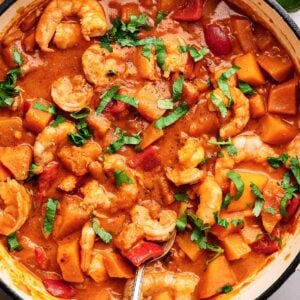
Thai Shrimp Curry
Equipment
Ingredients
- 1 small onion, finely chopped
- 2 large garlic cloves, minced
- 1 tablespoon fresh ginger, minced
- 1 large red bell pepper, diced
- 1 tablespoon oil, for frying
- 14 ounces can coconut milk, full fat or light
- 1/4 cup tomato paste, low sodium
- 4 teaspoons red curry paste
- 1 tablespoon maple syrup or honey
- 2 teaspoons fish sauce
- 1/4 teaspoon salt
- 1/4 teaspoon ground black pepper
- 1 pound raw shrimp, peeled, deveined and tails off
- 1 pound butternut squash or sweet potatoes, cut into 1-inch cubes
- 3 tablespoons cilantro, finely chopped
- 1 lime, for serving
Instructions
- Preheat large deep skillet on medium-high heat and swirl oil to coat. Add onion, garlic, ginger and bell pepper; cook for 5 minutes, stirring occasionally.
- Add coconut milk, tomato paste, red curry paste, maple syrup, fish sauce, salt and pepper. Stir and bring to a boil.
- Add butternut squash, stir, cover and cook on low heat for 15-20 minutes or until squash is fork tender.
- Add shrimp, cover and cook for another 3-4 minutes. Do not over cook as shrimp will become rubbery.
- Garnish with lime and cilantro. Serve hot with rice or quinoa.
Notes
- Store: Refrigerate covered for up to 4 days.
- Freeze: In an airtight container for up to 3 months.
Nutrition
Nutrition information is automatically calculated, so should only be used as an approximation.
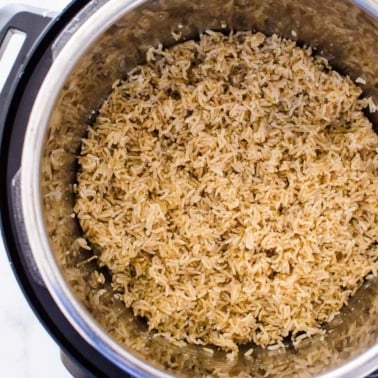
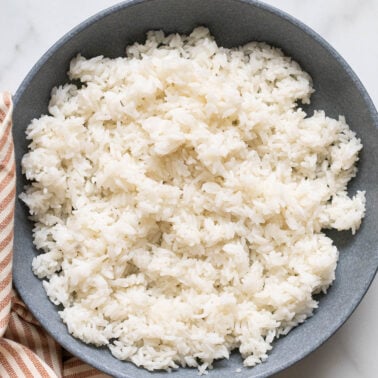
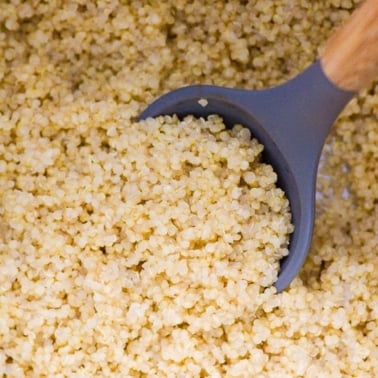
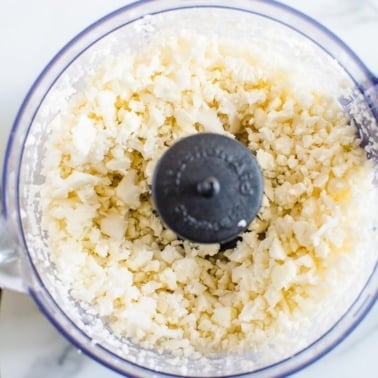

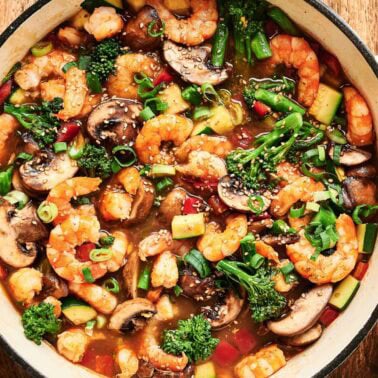
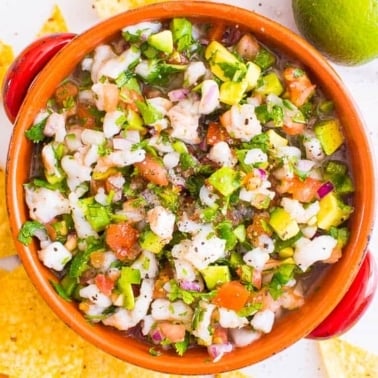
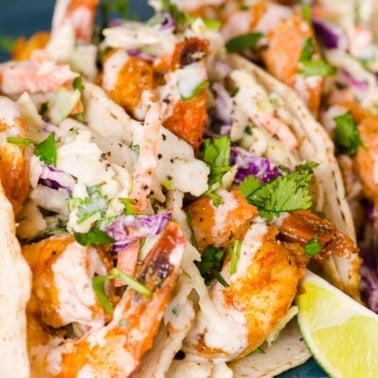
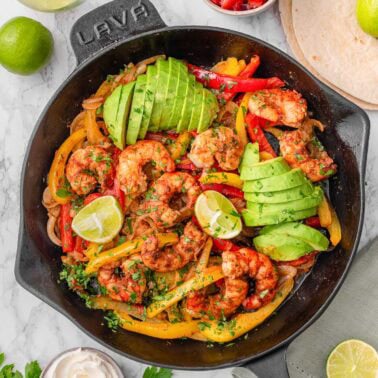









Can this be done as a freeze ahead meal?
Yes but without shrimp. More likely you buy frozen shrimp anyways, so just add it at the end. Enjoy!
If I can’t find thai basil leaves or kaffir lime leaves, do you suggest I use something else or just leave them out?
Thanks!
You can just omit them if you are not able to find them. They are totally optional:)
Just made this – my family really loved it! I didn’t have bell pepper so added more onion and substituted broccoli.I precooked the cubed butternut squash in the microwave and added it to the sauce. I also sauteed the shrimp separately in garlic and butter for the vegetarians here. Thanks so much for this!
So welcome Juli!
I made this but had no cilantro so used parsley (flat) instead, and ground ginger. Also no kaffir leaves. So I guess it will be an approximation. It was excellent: nice and spicy. The shrimp were rather time consuming,so maybe its best to use pre- peeled shrimp.
Awesome, those are great subs. Yes, only pre-peeled shrimp for me.:)
This was really good! I added some simbal and a bit of franks because we like it spicy! Also I thinned the sauce a bit because it’s thick and then it goes a lot longer.
Fantastic! Glad you enjoyed the recipe, Joyce! Not sure what simbal is but as long as you like it.:)